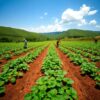Kenya is a major player in the global avocado market, ranking as the sixth-largest producer in the world. In 2023, Kenyan farmers produced an impressive 633,000 metric tons of avocados, establishing themselves as key contributors to the international avocado trade.
The potential for profit through Hass avocado exports has never been more promising. Export revenues are projected to reach $175 million in 2025, representing an 11% increase from the previous year. This growth is driven by rising global demand and improved production capabilities in Kenya’s agricultural sector.
This article explores:
- Current avocado production statistics and market trends
- The unique advantages of Hass avocados in export markets
- Modern farming techniques boosting crop yields
- Essential export regulations and compliance requirements
- Strategic approaches to accessing international markets
- Practical solutions for common export challenges
Whether you’re a smallholder farmer managing 10-20 trees or an established producer looking to expand your export operations, you’ll find valuable insights to maximize your profits in the thriving avocado export market of 2025.
Kenya’s Avocado Production Landscape
Kenya’s avocado industry is a major player in global agriculture, producing 633,000 metric tons in 2023. The industry relies heavily on its smallholder farmers – a remarkable network of 966,000 individuals managing modest plots with 10-20 trees each. These dedicated farmers contribute to 70% of the country’s total avocado production.
Key Counties for Avocado Farming
Avocado farming is spread across several important counties in Kenya:
- Murang’a (32% of production)
- Kisii (24.7% of production)
- Nakuru
- Nyeri
- Kiambu
The current yield averages 18 metric tons per hectare, which shows the industry’s efficiency and potential. Smallholder farmers have improved their farming methods by using modern techniques and high-quality seedlings to increase their output.
Growth Projections for Kenya’s Avocado Production
Looking ahead to 2025, there are positive growth expectations for Kenya’s avocado production:
- 4% increase in production, reaching 585 TMT
- 6% expansion in planted areas, extending to 34,000 hectares
- Enhanced yield potential through improved farming practices
The expected increase in production is mainly due to two factors: more land being used for avocado farming and the use of techniques that boost yields. Small-scale farmers are at the forefront of this growth, adapting their methods to meet international standards while also prioritizing sustainable production.
Kenya’s Global Standing in Avocado Production
These production figures make Kenya the sixth-largest avocado producer globally, showcasing the country’s significant role in the international avocado market. The steady increase in production capacity opens up new opportunities for farmers to enter profitable export markets while also ensuring a stable supply for domestic consumption.
Understanding Hass Avocados and Their Export Potential
Kenya’s avocado industry thrives on two primary varieties: Hass and Fuerte. Each variety follows distinct harvesting patterns:
Hass Avocados
- Main harvest: March to August
- Dark, bumpy skin that turns purple-black when ripe
- Creamy texture with nutty flavor
- Longer shelf life
- Superior shipping resistance
Fuerte Avocados
- Main harvest: October to December
- Smooth, green skin
- Lighter flavor profile
- Shorter shelf life
Hass avocados command premium prices in international markets due to their unique characteristics. The thick, pebbly skin acts as natural protection during transportation, reducing damage and extending shelf life up to 4 weeks. This variety maintains consistent quality throughout the ripening process, making it ideal for long-distance shipping.
Export markets particularly value Hass avocados for their:
- 25% higher oil content
- Predictable ripening patterns
- Resistance to handling damage
- Year-round demand in global markets
The growing global appetite for Hass avocados creates significant opportunities for Kenyan farmers. European markets show strong preference for Hass varieties, with demand increasing by 15% annually. Asian markets, particularly China, represent emerging opportunities with a rising middle class seeking premium avocado varieties.
The versatility of Hass avocados in various culinary applications, from guacamole to smoothies, drives consistent demand in food service and retail sectors. This variety’s popularity in health-conscious markets positions Kenyan farmers to tap into lucrative export opportunities.
Modern Agricultural Practices Driving Yield Improvement
Kenyan farmers are revolutionizing avocado production through advanced agricultural practices, pushing yields to an impressive 18 metric tons per hectare. These modern techniques have transformed traditional farming methods into efficient, high-yield operations.
Irrigation Innovation
- Drip irrigation systems deliver precise water amounts directly to root zones
- Smart irrigation scheduling based on soil moisture sensors
- Water-efficient practices reduce waste and maintain consistent fruit development
Quality Seedling Selection
- Certified disease-resistant rootstock
- Grafted Hass varieties from authorized nurseries
- Early-maturing cultivars for strategic market timing
Advanced Crop Management
- Precision fertilization programs tailored to soil analysis
- Integrated pest management reducing chemical dependence
- Pruning techniques optimizing tree architecture and fruit load
Technology Integration
- Soil testing kits for nutrient monitoring
- Digital apps tracking weather patterns
- Remote sensing for early disease detection
These practices have led to significant improvements in fruit quality:
- Uniform size distribution
- Enhanced skin texture
- Consistent oil content
- Extended shelf life
Farmers implementing these modern techniques report a 30-40% increase in marketable yield compared to traditional methods. The adoption of these practices has strengthened Kenya’s position in the global avocado market, with producers meeting strict international quality standards while maintaining sustainable production methods.
Small-scale farmers can access these technologies through agricultural cooperatives and government support programs. Training centers across major avocado-producing counties provide hands-on experience with modern farming techniques, ensuring widespread adoption of best practices.
The success of this agricultural transformation is not limited to avocados alone. Similar advanced crop management strategies are being adopted across various sectors, leading to overall improvements in yield and quality.
Moreover, the emphasis on quality seedling selection is proving beneficial not just for avocados but also for other crops, highlighting the versatility and effectiveness of these modern agricultural practices.
Balancing Domestic Consumption with Export Opportunities
Kenya’s avocado market demonstrates a strategic balance between local consumption and international trade opportunities. The domestic market absorbs 47% of the total avocado production, making Kenyans the highest per capita consumers of avocados in Africa at 6 kg per person annually.
Domestic Market Dynamics:
- Local consumption remains strong due to affordable pricing
- Avocados are integrated into daily meals with staples like ugali
- Fresh fruit availability in local markets year-round
- Growing awareness of nutritional benefits drives demand
Export Market Potential:
- 53% of production designated for international markets
- Projected export volume: 135 TMT in 2025
- Expected revenue forecast: $175 million in 2025
- 11% year-on-year revenue growth rate
The distribution pattern reveals a robust domestic foundation while maintaining significant export capacity. Local markets provide immediate cash flow for farmers, reducing dependency on international market fluctuations. This dual-market approach creates a resilient economic model for Kenyan avocado farmers.
Price Dynamics:
- Export markets offer premium prices
- Local markets provide steady income streams
- Price variations between domestic and international sales
- Seasonal price fluctuations affect both markets
The growing global demand for avocados creates opportunities for Kenyan farmers to expand their market reach while maintaining strong domestic sales. This balanced approach ensures sustainable growth and market stability for the industry.
Navigating Export Regulations and Market Trends
The Kenyan Agriculture and Food Authority (AFA) has implemented strict export regulations to maintain quality standards in international markets. A notable development occurred on March 17, 2025, when AFA lifted the suspension on Hass avocado exports following comprehensive maturity evaluations.
Key Export Requirements:
- Mandatory packhouse inspections before shipment
- Detailed documentation submission by mid-March
- Strict maturity testing protocols
- Quality certification for all export batches
The European market remains Kenya’s primary export destination, with the Netherlands leading at 32% market share. This strategic partnership has opened doors to wider European distribution networks. The UAE has emerged as a significant market, claiming 16% of Kenyan avocado exports, while Spain accounts for 13%.
Distribution of Export Markets:
- Netherlands: 32%
- UAE: 16%
- Spain: 13%
- France: 11%
- Germany: 7%
Recent market dynamics have created new opportunities for Kenyan exporters. The US implementation of new taxes on Mexican avocado imports in March 2025 has shifted global trade patterns. This development presents Kenyan farmers with potential market advantages, particularly in regions seeking alternative supply sources.
The successful navigation of these regulations and market trends requires exporters to maintain consistent quality standards. Regular updates from AFA guide exporters through compliance requirements, ensuring Kenyan avocados meet international market expectations.
Overcoming Challenges to Access Established and Emerging Markets
Kenyan avocado exporters face significant logistical hurdles in their quest to reach international markets. Limited cold storage facilities and inadequate transportation infrastructure can impact fruit quality during transit. The distance to major markets creates additional complexities, requiring careful planning and coordination to maintain product freshness.
Competition from established exporters like Mexico and Peru presents another challenge. These countries benefit from:
- Well-developed supply chains
- Advanced post-harvest handling facilities
- Strong market relationships
- Established brand recognition
Despite these challenges, Kenyan farmers can capitalize on several opportunities:
Market Diversification Strategy
- Expand beyond traditional European markets
- Target emerging Asian markets, particularly China
- Explore regional African markets with growing middle-class populations
Quality Enhancement Measures
- Invest in GlobalGAP certification
- Implement strict quality control systems
- Adopt modern packaging solutions
- Maintain consistent fruit size and maturity levels
Collaborative Approaches
- Form farmer cooperatives to share resources
- Partner with established exporters
- Pool resources for cold storage facilities
- Share transportation costs
The recent US tax on Mexican avocados creates a unique opportunity for Kenyan exporters to increase their market share. By focusing on quality standards and efficient supply chain management, Kenyan farmers can position themselves as reliable suppliers in both established and emerging markets.
Small-scale farmers can benefit from joining forces with larger producers or exporters to overcome infrastructure limitations. This collaboration helps maintain consistent supply volumes and meet international market demands while sharing operational costs.
Conclusion
The future of Kenya’s Hass avocado export market looks promising for 2025. With projected export revenues reaching $175 million and a growing global demand, Kenyan farmers have great opportunities to make significant profits. The combination of more land being used for avocado farming, better farming practices, and smart marketing strategies sets a strong foundation for success.
Key benefits for Kenyan farmers include:
- Higher profit margins through direct export channels
- Access to premium markets in Europe and emerging Asian markets
- Increased farm sustainability through modern farming techniques
- Stable income streams from year-round production cycles
You can make a difference in supporting Kenya’s agricultural growth. When shopping for avocados, look for the “Product of Kenya” label. Your choice directly impacts the livelihoods of nearly 1 million smallholder farmers who work tirelessly to bring high-quality Hass avocados to your table. By choosing Kenyan avocados, you’re not just selecting premium fruit – you’re investing in the future of sustainable farming and supporting local communities.
FAQs (Frequently Asked Questions)
What is Kenya’s role in the global Hass avocado market in 2025?
Kenya plays a significant role in the global Hass avocado market by being one of the leading producers and exporters. In 2025, Kenyan farmers are projected to benefit from increased production and export opportunities, contributing substantially to the global supply of Hass avocados.
How do modern agricultural practices improve Hass avocado yields for Kenyan farmers?
Modern agricultural practices such as advanced irrigation techniques and the adoption of high-quality seedlings have significantly improved yield and fruit quality for Kenyan Hass avocado farmers. These practices enhance productivity, enabling farmers to meet export standards and increase profitability.
What are the main export markets for Kenyan Hass avocados in 2025?
In 2025, major export destinations for Kenyan Hass avocados include the Netherlands, United Arab Emirates (UAE), and Spain. These established markets offer lucrative opportunities for Kenyan farmers to profit from their exports.
How do domestic consumption and export opportunities balance in Kenya’s avocado industry?
While a portion of avocados produced in Kenya is consumed domestically, a growing percentage is exported due to increasing demand in international markets. The revenue forecast for 2025 indicates that exports, particularly of Hass avocados, will generate substantial income for Kenyan farmers alongside satisfying local consumption.
What challenges do Kenyan avocado exporters face when accessing established and emerging markets?
Kenyan avocado exporters encounter logistical difficulties, stringent export regulations, and competition from other producing countries. However, by adhering to export standards and tapping into both established markets like Europe and emerging markets such as the UAE, farmers can overcome these challenges and profit from exporting Hass avocados.
Why are Hass avocados preferred over other varieties like Fuerte in export markets?
Hass avocados are particularly sought after in export markets due to their superior taste, longer shelf life, and consistent quality compared to varieties like Fuerte. This preference makes them more profitable for Kenyan farmers focusing on exports in 2025.






